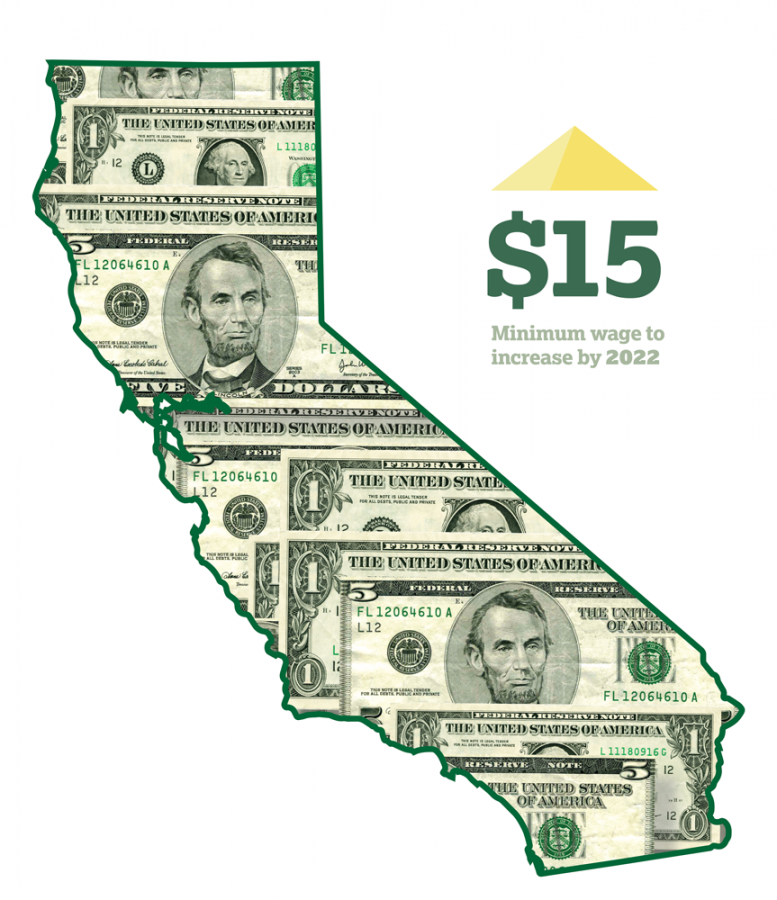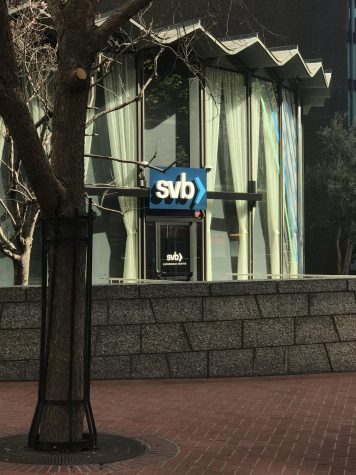California minimum wage to hit $15 by 2022
April 6, 2016
The people have spoken and legislators listened, finalizing a California law that will set the minimum wage bar high for the rest of the country.
On Monday Gov. Jerry Brown signed a law that will increase the state’s minimum wage to $15 dollars by 2022. The state minimum wage is currently $10 and is one of the highest in the country. In some California cities, it is higher. In 2014, voters passed Proposition J to raise the minimum wage in San Francisco incrementally to $15 by 2018, according to the City of San Francisco’s Office of Labor Standards Enforcement. It is currently $12.25 and will increase to $13 on July 1, 2016.
The new law was set in motion by a compromise between labor unions and legislators on March 26, according to the Associated Press. The law will take effect next year, increasing 50 cents on Jan. 1, 2017 and will reach $11 in 2018. It will rise one dollar each year after, until it hits $15 in 2022, according to the Governor’s office. Businesses with 26 or more employees will be immediately subject to these terms, however those with 25 or fewer employees will have extended time to phase in the increases.
Sen. Mark Leno, D-San Francisco, authored the statewide legislation last year as SB 3, which originally proposed to raise the minimum wage to $13 by 2017 but stalled in the assembly due to a lack of support. Leno told the Associated Press that the new legislation emerged as a development of that bill.
“My strong support for a statewide minimum wage that raises California families, women and children out of poverty is unshakeable,” Leno told the Sacramento Bee last year. California is currently home to approximately 7 million hourly workers, of which 2.2 million earn minimum wage, according to the governor’s press release.
According to Jed DeVaro, Department of Management professor and Chair of Economics at East Bay, low-wage workers and their employers will be affected the most by the minimum wage increase, but not necessarily in a positive way. Small businesses may take a hit as production costs rise and California will likely see cutbacks in employee hours, a shortage of jobs as employers become reluctant to hire and even some businesses being forced to close because they can’t afford to pay the increased wages.
“If we go back probably 25 years, this was an area on which economists agreed that it [minimum wage] wasn’t a very good idea,” said DeVaro.
DeVaro explained that minimum wage laws stem from good intentions, with the main goal to help those living in poverty rise out of it, but they are poorly targeted. However, since higher minimum wages can discourage businesses from hiring new employees, the people the law is meant to help are often the ones negatively impacted. Current job-holders and low income workers who still live with their parents in high income households, like students, will be the ones who benefit, according to DeVaro.
“The problem is, it’s a very poorly-targeted poverty alleviation program,” said DeVaro. “There’s winners and losers and the winners aren’t necessarily the people you want to be helping.”
California’s minimum wage may surpass most of the states in the country, 44 of which are $9 minimum wage or below, according to the U.S. Department of Labor, but it isn’t the only one to make the jump to $15. On Monday, New York Gov. Andrew M. Cuomo signed a law that would raise the state’s minimum wage to $15 over time, according to a news release by the New York State’s governor office. However, the increases would differ for employees working in specific counties, cities and for small or large businesses, while California’s would consistently raise the same amount throughout the state for all workers.
According to DeVaro, the hiked production costs of an increased minimum wage may deter other states from opening businesses in California, which will turn employment opportunities away. “It tilts the balance against California,” said DeVaro.
DeVaro supports the idea of eliminating minimum wage in favor of expanding the Earned Income Tax credit program, a federal income tax-based benefit that provides refunds and tax coverage to working low-income families. He believes it is a better-targeted initiative because recipients have to meet certain criteria in order to qualify, unlike minimum wage.
According to a national survey conducted in Jan. 2015 by Hart Research Associates for the National Employment Law Project, 63 percent of Americans supported raising the federal minimum wage to $15 by 2020.
“This is about economic justice, it’s about people,” said Gov. Brown at the bill signing in Los Angeles on Monday morning. “This is an important day, it’s not the end of the struggle but it’s a very important step forward.”

















